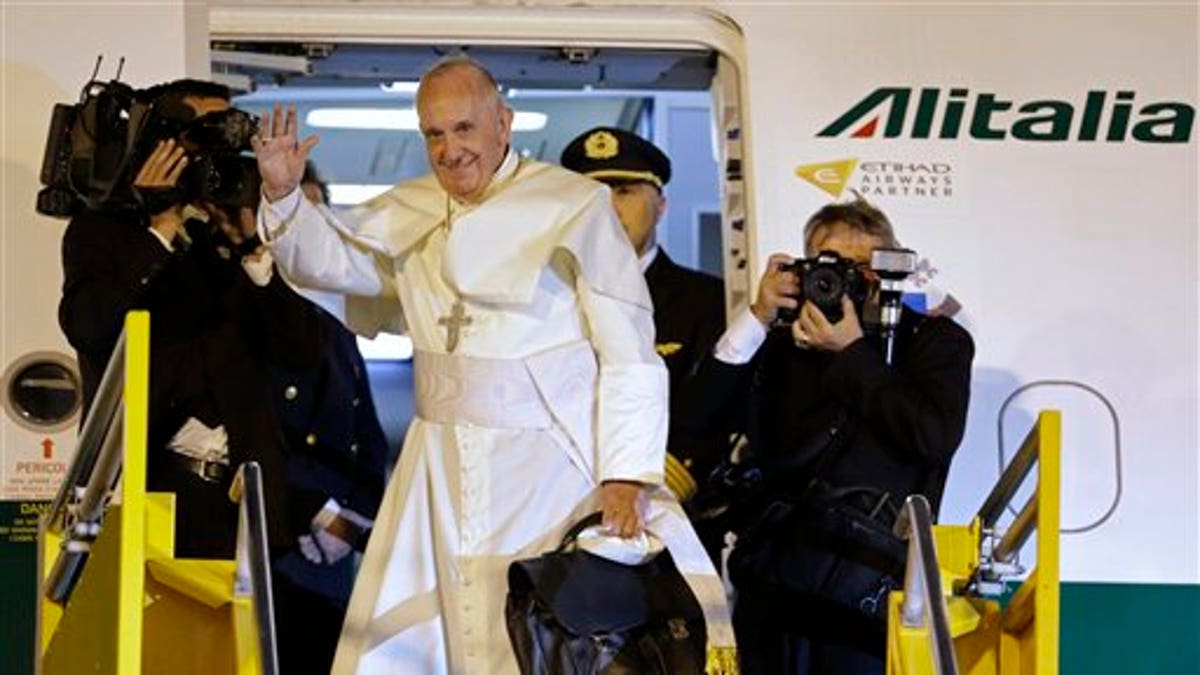
Pope Francis waves goodbye before boarding the plane in Asuncion, Paraguay, Sunday, July 12, 2015. (ap)
ABOARD THE PAPAL PLANE (AP) – Pope Francis is acknowledging criticism in the United States of his anti-capitalist stance and is calling for dialogue before his high-profile trip in September. He's also downplaying his role in the U.S.-Cuba rapprochement.
Francis spent much of the past week in South America — and before that many speeches and two key teaching documents — railing against the injustices of today's "structurally perverse" global economic system that puts profit ahead of people. U.S. conservatives — among them many high-profile Catholics — have called his attacks on fossil fuels and the free-market economy flawed and irresponsible, given that many millions of people have been lifted out of poverty thanks to capitalism.
Francis told reporters en route home to Rome on Sunday that he had heard about the criticisms in the U.S., but hadn't had a chance to read up on it given he was preparing for his visit to three of South America's poorest countries: Ecuador, Bolivia and Paraguay —"three beautiful countries, such richness, such beauty," he said.
"You ask me what I think. If I have not had a dialogue with those who criticize, I don't have the right to state an opinion, isolated from dialogue," he said.
"I must begin studying these criticisms, no? And then dialogue a bit with this."
- Pope Francis receives warm welcome in first visit to Latin America
- Best pix of the week
- Pope Francis lands in Bolivia, whose president is fan despite rocky past with Church
- Pope may chew coca leaves to fend off altitude sickness during Bolivia trip
- Pope Francis gets rock star treatment in first visit to South America as pontiff
- Where’s The Popemobile? Pope Travels Through South Korea In A Kia
Francis is due to visit Washington, New York and Philadelphia from Sept. 22-27. One of the most-watched events will be his Sept. 24 speech to a joint session of the U.S. Congress, where U.S. Republicans have largely ignored his new encyclical on the environment.
Francis added a Cuba leg onto the beginning of the trip — from Sept. 19-22 — after helping bring about the historic thaw in U.S.-Cuba relations that is resulting in the reopening of the U.S. Embassy in Havana on July 20.
Francis insisted that he had played only a small role in the rapprochement, even though both U.S. President Barack Obama and Cuban President Raul Castro singled him out for praise when they announced the breakthrough in December.
"We did hardly anything, only small things," Francis said. "There was a desire that had arrived — on the other side also a desire."
Francis said he prayed for nearly three months after the initiative began in January 2014. Eventually, Francis wrote to both leaders. He said he was surprised when at one point his No. 2, Secretary of State Cardinal Pietro Parolin, told him that the U.S. and Cuban delegations would be meeting the following day.
Francis recalled saying "'How's that?'"
"'Yes, yes, they are talking, they are talking,'" he quoted Parolin as saying.
"It was the goodwill of the two countries, and the merit is theirs. The merit is theirs for doing this," he said.
He said the process of negotiation was one of compromise.
"Both will gain peace, meetings, friendship, collaboration ... these they will gain. But what will they lose? I cannot imagine. But in negotiations, one always wins and loses."
